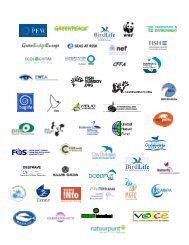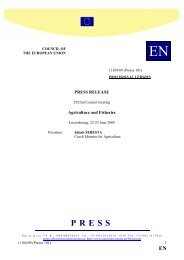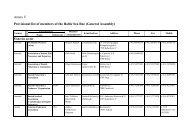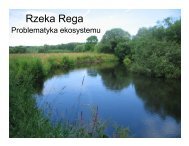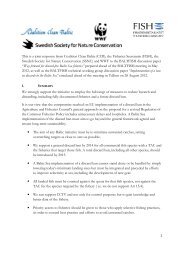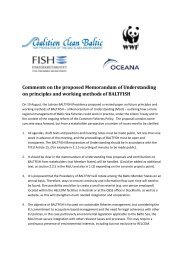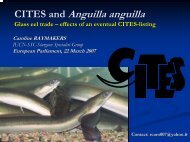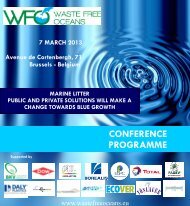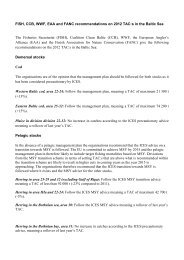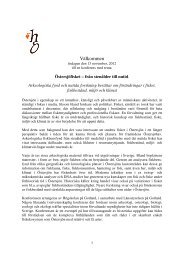A report on iUU fishing of Baltic Sea cod - Fisheries Secretariat
A report on iUU fishing of Baltic Sea cod - Fisheries Secretariat
A report on iUU fishing of Baltic Sea cod - Fisheries Secretariat
You also want an ePaper? Increase the reach of your titles
YUMPU automatically turns print PDFs into web optimized ePapers that Google loves.
Executive summaryThe <strong>cod</strong> fisheries in the <strong>Baltic</strong> <strong>Sea</strong> have gainednotoriety for n<strong>on</strong>-compliance with fisheriesregulati<strong>on</strong>s. This is comm<strong>on</strong>ly referred to as illegal,un<str<strong>on</strong>g>report</str<strong>on</strong>g>ed and unregulated <strong>fishing</strong> or IUU<strong>fishing</strong>. IUU <strong>fishing</strong> is seen as the major c<strong>on</strong>tributorto the unsustainable exploitati<strong>on</strong> <strong>of</strong> the <strong>cod</strong>stocks, particularly in the Eastern <strong>Baltic</strong> <strong>Sea</strong>, somuch so that this stock is now threatened withcollapse.This <str<strong>on</strong>g>report</str<strong>on</strong>g> is divided into two parts. The firstdescribes the results <strong>of</strong> the literature search andpresents the views expressed by participants <strong>of</strong>the informal meetings/interviews. The sec<strong>on</strong>dpart provides a summary <strong>of</strong> the policy and regulatoryframeworks that are in place and providethe basis for Member States to implement Europeanfisheries policy.Published informati<strong>on</strong>Limited literature is available that describesor quantifies the IUU <strong>fishing</strong> within the <strong>Baltic</strong>regi<strong>on</strong>. The Internati<strong>on</strong>al Council for the Explorati<strong>on</strong><strong>of</strong> the <strong>Sea</strong> (ICES) has attempted to takeaccount <strong>of</strong> the quantities <strong>of</strong> un<str<strong>on</strong>g>report</str<strong>on</strong>g>ed landingswithin its fisheries assessment advice to the EuropeanCommissi<strong>on</strong>. Using a variety <strong>of</strong> sourcesthat includes fishermen, fisheries inspectors andfirst-hand observati<strong>on</strong>s by fisheries scientists, itis estimated that in the Eastern <strong>Baltic</strong>, 35-45%more <strong>cod</strong> is landed than <str<strong>on</strong>g>report</str<strong>on</strong>g>ed.Other recent <str<strong>on</strong>g>report</str<strong>on</strong>g>s and news articles suggestthat possibly even larger quantities are landed.However, owing to the clandestine nature <strong>of</strong>the activity it is not possible to c<strong>on</strong>firm withoutdoubt what the quantities might be.IUU <strong>fishing</strong> activitiesIn discussi<strong>on</strong>s with a broad secti<strong>on</strong> <strong>of</strong> individualswith an active interest in the <strong>cod</strong> fishery tenforms <strong>of</strong> IUU activity were cited. There was ac<strong>on</strong>sensus view that un<str<strong>on</strong>g>report</str<strong>on</strong>g>ed landings werethe most significant IUU <strong>fishing</strong> activity. Theseappear to be more prevalent at different times<strong>of</strong> the year, from year to year and within certainfleet sectors, such as trawl and gillnet fisheries.For example, tighter quota restricti<strong>on</strong>s wouldlikely lead to increases in unrecorded landings;area closures would coincide with apparentfailures in VMS; and, a str<strong>on</strong>g year class enteringthe fishery could result in increased landings <strong>of</strong>undersize <strong>cod</strong>.Poland was seen by many as the “bad boy” inthe <strong>Baltic</strong>, but those Member States that have theli<strong>on</strong>-share <strong>of</strong> the total allowable catch were alsoimplicated.The cause <strong>of</strong> IUU <strong>fishing</strong>In simple terms, the cause <strong>of</strong> IUU <strong>fishing</strong> wasdescribed as a functi<strong>on</strong> <strong>of</strong> fleet overcapacity, decliningquotas, an inability to effectively m<strong>on</strong>itorand c<strong>on</strong>trol the fisheries, high c<strong>on</strong>sumer demandand high ec<strong>on</strong>omic value. In part or as a whole,these create an added incentive to fish.Further detailed analysis <strong>of</strong>fered by a Danishstudy c<strong>on</strong>cluded that the following are all factorsthat influence compliance:• the likely ec<strong>on</strong>omic gains to be had fromcheating;• the risks <strong>of</strong> being detected and the severity <strong>of</strong>the sancti<strong>on</strong>;• compatibility between the c<strong>on</strong>tent <strong>of</strong> <strong>fishing</strong>regulati<strong>on</strong>s and <strong>fishing</strong> patterns/practices;• l<strong>on</strong>g-term n<strong>on</strong>-compliant behaviour becomes‘normal’ behaviour such that moral standardsare affected.How to reduce IUU <strong>fishing</strong>Reducing fleet capacity was seen as an importantfactor that would likely reduce IUU <strong>fishing</strong>. Some<strong>fishing</strong> industry representatives from the ‘older’Member States c<strong>on</strong>sidered that their nati<strong>on</strong>alfleet capacities are more in line with their quotasand that this balance needs to be quickly– –



